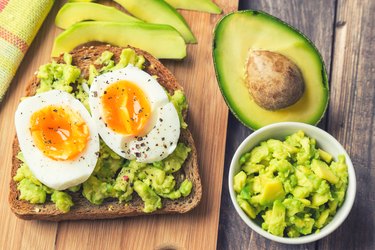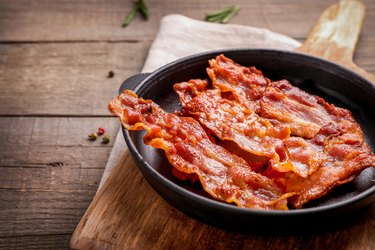
Protein often gets all the credit when it comes to making gains, but fat is an important part of muscle growth, too.
While dietary fat (i.e. the fat found in foods such as nuts, avocado and oily fish) can't directly build muscle, it does play a significant role: Eating healthy fats is important for absorbing essential vitamins and producing energy and hormones necessary for muscle growth.
Video of the Day
Video of the Day
How Does Fat Help Build Muscle?
Dietary fat protects cell membranes, the vital exterior of every cell, and sheaths surrounding nerves, per Harvard Health Publishing. It's also essential for muscle movement, blood clotting and inflammatory response, which helps the body repair from injury after training.
It Helps Maintain Your Hormone Levels
Fat helps maintain your hormone levels, which is crucial for building muscle.
Testosterone, a hormone that helps build muscle, naturally declines with age, per the Academy of Nutrition and Dietetics. And following a low-fat diet can decrease testosterone levels, making it harder to gain muscle.
A May 2014 review in the Journal of the International Society of Sports Nutrition shows that significantly restricting fat intake may lead to low testosterone levels — which is important in both people assigned male at birth (AMAB) and people assigned female at birth (AFAB).
People AMAB who followed a low-fat diet had an average of 63 percent less testosterone than men who followed a higher fat diet, per a March 2021 meta-analysis in The Journal of Steroid Biochemistry and Molecular Biology.
It Helps You Absorb Important Nutrients
In addition to providing energy, fat also facilitates the absorption of fat-soluble vitamins— vitamins A, D, E and K — which all have a role in building and maintaining muscle.
Vitamin A: This nutrient is well-known for its vision-related benefits, but it's also particularly important as an antioxidant, especially during endurance training, per the Academy of Nutrition and Dietetics.
Vitamin D: You need fat-soluble vitamin D for normal muscle function — low vitamin D levels are associated with the risk of falls and muscle instability, according to a June 2018 Bone Reports study.
Vitamin E: This vitamin can prevent muscle atrophy and promote muscle regeneration, per a July 2014 study in Oxidative Medicine and Cellular Longevity, where researchers found that a vitamin E deficiency inhibits healing. This is important because muscle cells get membrane tears just from being used, and part of how muscle is built is from the natural tearing and repair process.
Vitamin K: Athletes use vitamin K to help recover and strengthen muscles. But without fat in the diet to help its absorption, they may not get the benefits of vitamin K, even in supplemental form. A small July 2017 study in Alternative Therapies in Health and Medicine linked vitamin K2 to helping restore mitochondrial function and increasing the function of skeletal and cardiac muscle.
How Much Fat Do You Need Per Day to Build Muscle?
If gaining muscle is your goal, getting around 15 to 20 percent of your calories from fat is ideal, according to a May 2014 report in the Journal of the International Society of Sports Nutrition. So if you eat a 2,000-calorie diet, aim for 33 to 44 grams of fat per day.
Why the Type of Fat You Eat Matters
Fat is not all created equal and some are better than others when it comes to muscle building. Although most foods contain a combination of different types of fat, fatty acids are primarily divided into unsaturated, saturated and trans fats.
- Unsaturated fat is the healthiest type of fat — it's the kind of fat mostly found in plant-based foods and oils as well as fatty fish. Foods containing mostly mono- and polyunsaturated fats can improve blood cholesterol levels, which can reduce your risk of heart attacks and type 2 diabetes, according to the Mayo Clinic.
Omega-3 is a specific type of unsaturated fat that's essential for brain function and cell growth, including your muscles. Omega-3 fatty acids include ALA (alpha-linolenic acid), EPA (eicosapentaenoic acid) and DHA (docosahexaenoic acid). - Saturated fats are found naturally in animal products such as meat, chicken and dairy products, and also in some tropical oils and nuts. While there's no need to cut out all saturated fat from your diet, the 2020-2025 Dietary Guidelines for Americans recommend limiting saturated fat to 10 percent of your daily calories and replacing it with healthy unsaturated fats.
A small July 2014 trial in Diabetes found that gaining weight from polyunsaturated fat appears to cause more gain in muscle mass and less body fat compared to eating a similar amount of saturated fat. Researchers think polyunsaturated fat has a more favorable effect on fat distribution than saturated fats by increasing energy or decreasing the storage of dangerous visceral fat. - Trans fats are naturally found in small amounts in meat and dairy products, but there are also man-made trans fats, such as those found in commercially baked goods. Trans fats increase your risk of stroke and heart disease, per the American Heart Association.
What About MCTs for Muscle Building?
Medium-chain triglycerides, or MCTs, have become popular with athletes and bodybuilders for their fat-burning and energy-sustaining potential. But it's unclear that MCT oil (like that found in coconut and palm oil) really helps with muscle growth.
MCTs are absorbed and metabolized quicker than other fats with long-chain triglycerides (LCT), such as olive oil, nuts and avocados. This results in a quicker energy to fuel muscles, with less fat being stored as body fat, per an April 2013 Nutrition Review report.
Plus, replacing LCTs with MCTs is linked to satiety and weight loss, per a February 2015 meta-analysis in the Journal of the Academy of Nutrition and Dietetics, but further research is needed to confirm the effectiveness of MCT oils. Note that taking too much MCT oil may cause diarrhea, cramping, gas, bloating and abdominal discomfort, per a February 2017 Practical Gastroenterology study.
5 Best Fats to Eat to Build Muscle

1. Eggs
Eggs may be a perfect post-workout snack to build muscle, but don't skip the yolk. While almost all of the protein is found in egg whites, the yolk has fat and other nutrients that may be just as important for building muscle.
Eating whole eggs resulted in greater muscle protein synthesis than compared to egg whites, per a very small December 2017 study in the American Journal of Clinical Nutrition.
One hard-boiled egg has 5.3 grams of fat including 1.6 grams of saturated fat and 3.7 grams of unsaturated fat. If you're looking for a new way to enjoy your eggs, try these nutrient-dense egg recipes.
2. Salmon
Salmon and other fatty fish are excellent sources of omega-3 fatty acids, a type of polyunsaturated fat. A 3-ounce fillet of cooked wild Atlantic salmon has 6.9 grams of fat including 2 grams of omega-3 fatty acids.
Omega-3s seem to help with muscle building by improving the muscle response to insulin and amino acids released during exercise, per a November 2012 study in Clinical Science.
The American Heart Association recommends eating two servings of fatty fish, like salmon or herring, per week for heart health. Pair salmon with whole grains or quinoa, which are two healthy carbs to help build muscle.
3. Avocado
Avocado on toast, in your egg salad, or sliced up in a salad — no matter how you enjoy this creamy green fruit, it can help you build muscle while keeping you satisfied.
A quarter of an avocado has 7.4 grams of fat including 4.9 grams of monounsaturated fat.
Replacing butter, mayonnaise or other saturated fatty foods with avocado can help lower your LDL cholesterol, which reduces your risk of heart disease, per the National Library of Medicine. Try these tasty ways to eat avocado (that aren't guacamole or on toast).
4. Nuts
Walnuts, almonds, pecans and cashews and peanuts (which are technically a legume, actually) are high in unsaturated fats, vitamins, minerals, protein, fiber and antioxidants, per the Mayo Clinic.
Nuts are a very nutrient-dense food. A 1-ounce serving of walnuts has 186 calories and 19 grams of fat. Even though they do have a significant amount of calories, eating nuts doesn't necessarily lead to weight gain probably because nuts are high in satiating fats, per a December 2017 review in Nutrients.
5. Flaxseed
Flaxseed can help you lose weight and improve your heart health.
About 4 tablespoons of ground flaxseed per day for six months lowered systolic blood pressure by 10 points and diastolic blood pressure by 7 points compared to a placebo group in a December 2013 study in Hypertension.
Two tablespoons of ground flaxseed have 5.9 grams of fat, including 4 grams of polyunsaturated fats. You can enjoy the benefits of flaxseed in baked goods, granola, oatmeal and even by drinking flax milk.
3 Fats to Limit While You’re Building Muscle

1. Red Meat
Three ounces of cooked ground beef has 14 grams of fat including 5.4 grams of saturated fat. But red meat has long been scrutinized for its potential health risks, including increased cancer risk and heart disease risk, per the Cleveland Clinic.
In fact, every 1.7 ounces of unprocessed red meat resulted in a 9 percent increased risk for ischemic heart disease, per a July 2021 review in Critical Reviews in Food Science and Nutrition.
Try eating less red meat by swapping beef, pork and lamb for poultry, fish and plant-based proteins like tofu, tempeh, nuts, seeds and beans.
2. Butter
One tablespoon of butter has 12 grams of fat including 7.2 grams of saturated fat. Just one tablespoon of this fat will put you at 63 percent of the recommended amount of saturated fat in one day.
Replacing butter with more nutritious fat sources like olive oil, avocado or a plant sterol-enriched spread can help you get the fat you need to build muscle and keep your heart happy.
3. Processed Meat
Three slices of bacon have 12 grams of fat including 4 grams of saturated fat. Processed meat like bacon, sausage, lunch meat and hot dogs are associated with cancer and heart disease.
In 2015, the International Agency for Research on Cancer (IARC) classified processed meat as Group 1 carcinogenic to humans based on the high amount of evidence that processed meat causes colorectal cancer.
Limiting bacon can also help decrease your risk of heart disease. Eating 150 grams of processed meat per week — that's around 12 slices of pan-fried bacon — is linked to a 46 percent increased risk for heart disease and a 50 percent increased risk of death compared to not eating processed meat, per a September 2021 study in the American Journal of Clinical Nutrition that looked at more than 134,000 people for 9.5 years.
- Harvard Health Publishing: "The Truth About Fats: the Good, the Bad, and the In-Between"
- American Heart Association: "Dietary Fats"
- Academy of Nutrition and Dietetics: "Vitamin Needs of Athletes"
- Bone Reports: "Vitamin D and Muscle"
- Oxidative Medicine and Cellular Longevity: "Vitamin E in Sarcopenia: Current Evidences on Its Role in Prevention and Treatment"
- Alternative Therapies in Health and Medicine: "Oral Consumption of Vitamin K2 for 8 Weeks Associated With Increased Maximal Cardiac Output During Exercise"
- Dietary Guidelines: "Appendix 7. Nutritional Goals for Age-Sex Groups Based on Dietary Reference Intakes and Dietary Guidelines Recommendations"
- Medicine and Science in Sports and Exercise: "Nutrition and Athletic Performance"
- Linus Pauling Institute: "Essential Fatty Acids"
- The World Journal of Men’s Health: "The Role of Androgen in the Adipose Tissue of Males"
- National Institute of Health: "Understanding How Testosterone Affects Men"
- Academy of Nutrition and Dietetics: "4 Keys to Strength Building and Muscle Mass"
- Journal of the International Society of Sports Nutrition: "Evidence-Based Recommendations for Natural Bodybuilding Contest Preparation: Nutrition and Supplementation"
- Mayo Clinic: "Dietary Fats: Know Which Types to Choose"
- Diabetes: "Overfeeding Polyunsaturated and Saturated Fat Causes Distinct Effects on Liver and Visceral Fat Accumulation in Humans"
- American Heart Association: "Policy Position Statement on Regulatory and Legislative Efforts to Improve Cardiovascular Health by Decreasing Consumption of Industrially Produced Trans Fats"
- Nutrition Review: "Medium Chain Triglycerides (MCTs)"
- Practical Gastroenterology: "The Use of Medium-Chain Triglycerides in Gastrointestinal Disorders"
- Journal of the Academy of Nutrition and Dietetics: "Effects of Medium-Chain Triglycerides on Weight Loss and Body Composition: A Meta-Analysis of Randomized Controlled Trials"